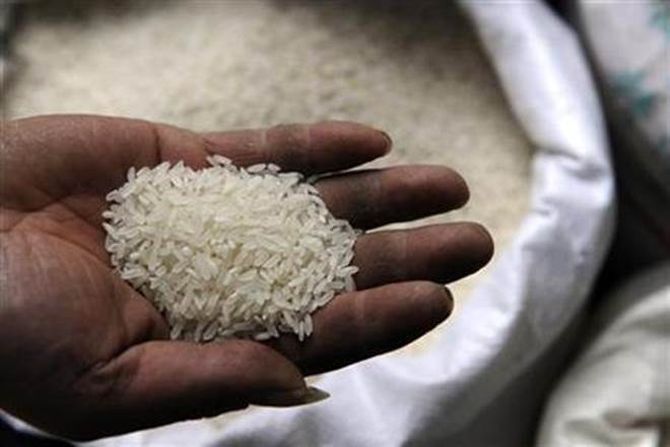In order to help farmers, the government has increased minimum support price for the last several years. This has made Indian rice uncompetitive for exports.

India’s exports of non-basmati rice declined by half between April and May this year after the government withdrew 5 per cent incentives from April 1.
Data compiled by the government-owned Agricultural & Processed Food Products Export Development Authority (Apeda) showed India’s overall exports at 711,837 tonnes for April-May 2019 compared to 1.53 million tonnes shipped for the corresponding period of the previous year.
In value term, India’s overall non-basmati rice exports plunged by more than 50 per cent to $ 294 million (Rs 2046 crore) for the first two months of FY 2019-2020 as against $ 652 million (Rs 4347 crore) in the same period last year.
The decline in non-basmati rice exports raises questions about India’s policy making, say analysts.
In order to help farmers, the government has increased minimum support price (MSP) for the last several years.
This has made Indian rice uncompetitive for exports.
A 5 per cent tax cushion encouraged 7-8 million tonnes in exports of non-basmati rice annually.
“Some importing countries like Bangladesh have started growing rice on their own which reduced their overall annual import.
"Trade sources are also blaming continuous MSP increase for a reduction in India’s non-basmati rice exports,” said a senior Apeda official.
Bangladesh had emerged as the largest importer of India’s non-basmati rice with 1.87 million tonnes in 2017-18.
In the following year, however, farmers in Bangladesh expanded their sowing area resulting into higher output from local sources and thus proportionate decline in their overall non-basmati rice import.
Thus, in FY 2018-19, India’s non-basmati rice exports plunged by a drastic 70 per cent to Bangladesh to a mere 480,567 tonnes.
With favourable agro climatic condition continues this year as well, United States Department of Agriculture (USDA) reported Bangladesh’s rice output to rise further 35.3 million tonnes this year as compared to 34.9 million tonnes and 32.6 million tonnes in 2018-19 and 2017-18 respectively.
“Declining import from Bangladesh is self-explanatory as to why India’s non-basmati rice exports are falling,” said the Apeda official.
In fact, exporters are worried over sustained rise in the MSP of paddy which translates into the proportionate increase in rice prices.
To attract farmers, the National Democratic Alliance (NDA) government led by the Bharatiya Janata Party (BJP) has raised MSP of common variety of paddy by 30 per cent in the last four years from Rs 1410 a quintal in 2015-16 to Rs 1815 a quintal in 2019-20.
“The sustained hike in MSP has made India outpriced by $25 in the world market resulting into lower demand of Indian rice.
"Other rice growing countries including Pakistan and Thailand have filled the gap,” said Gurnam Arora, joint managing director, Kohinoor Foods, one of the largest exporters of basmati and non-basmati rice in India.
With no relief in sight, India’s non-basmati rice exports are likely to fall steeply in coming months.
Meanwhile, bumper local production and possibility of less export are expected to worsen challenges for storage and handling of rice in India.
India’s total rice output is estimated at 115.6 million tonnes for 2018-19 as compared to 96.48 million tonnes reported in the previous year.
India’s annual rice consumption is estimated at around 90 million tonnes.
Photograph: Reuters











